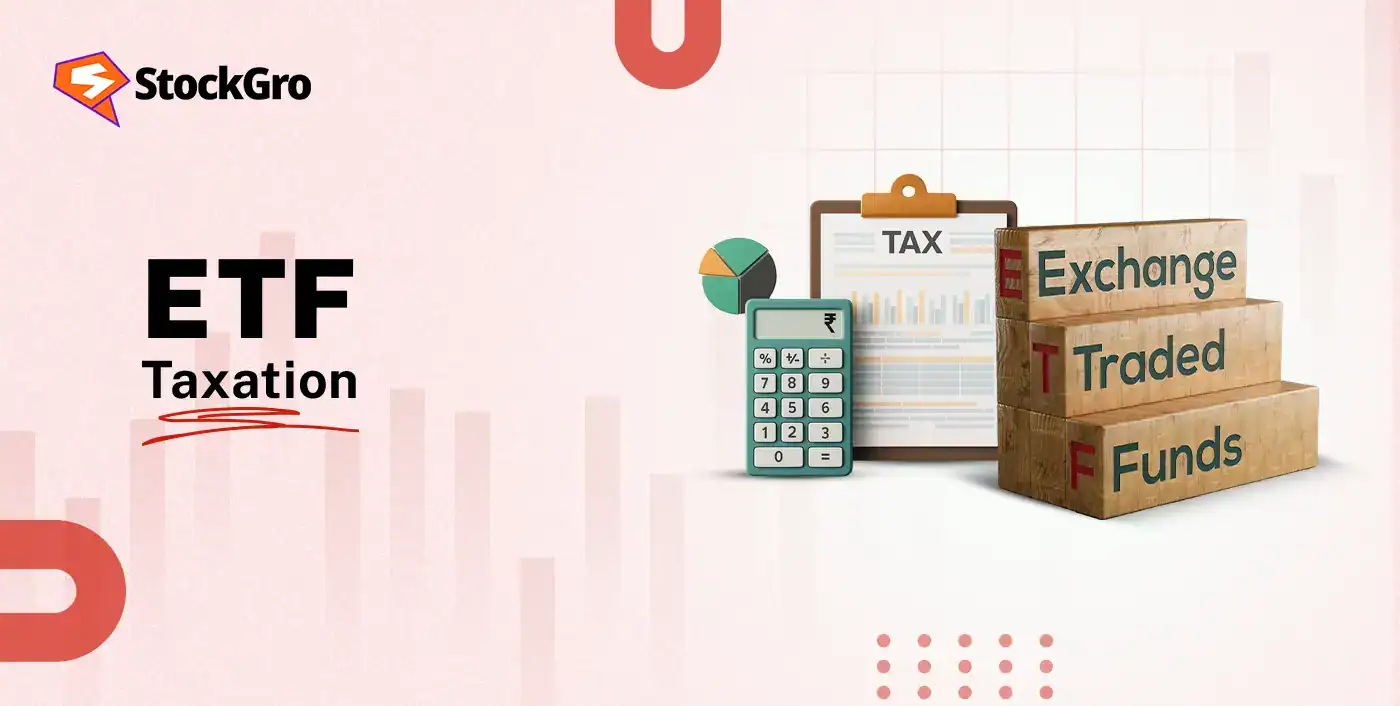
Gold and silver ETFs together attracted approximately ₹16,400 Cr in December 2025 according to AMFI estimates, with the combined assets under management of precious metals ETFs crossing the ₹2 trillion, reflecting how investors are focusing on precious metals for stability and diversification in a volatile market.
As ETFs attract investors’ attention for their liquidity, transparency, and diversification, understanding how they’re taxed becomes just as important. Having a clear understanding of ETF taxation in India helps investors make strategic decisions and maximise their post-tax returns.
This blog provides a complete guide to understand what an ETF is, how it works, and most importantly, the tax implications based on different types of ETFs and holding periods.
What is an ETF?
An ETF or Exchange-Traded Fund is a collection of asset classes such as stocks, bonds, or other assets. It is traded as a single stock or share on the stock exchanges. Investors mostly purchase ETFs to effortlessly diversify their portfolio into various asset classes. Moreover, the costs of ETFs are relatively lower than other mutual funds.
How Are ETFs Taxed in India
ETFs in India are taxed based on factors such as the nature of income, capital gain or dividend, type of ETF, equity ETFs or non-equity ETFs, and holding period.
The gains upon sale or redemption of ETFs are termed as capital gains, which is further categorised into short-term capital gains and long-term capital gains according to their holding periods. Let’s discuss further to understand.
Equity ETFs – STCG & LTCG
Equity ETFs are funds that invest a minimum of 65% into equities. Let’s understand equity ETFs taxation in detail:
- Short-term Capital Gains: For capital gains on equity ETFs held for 1 year or less, 20% tax is charged, effective from 23 July 2024.
- Long-term Capital Gains: For capital gains on equity ETFs held over 1 year, 12.5% tax is charged for gains over ₹1.25 lakh in a financial year, from 23 July 2024, without indexation.
Non-Equity ETFs (Debt, Gold, International)
Non-equity ETFs invest more in debt, gold, or other commodities, and international stocks or markets.
- Debt ETFs Taxation: The debt ETFs tax in India, has no separate tax rules or rates based on short-term or long-term capital gains. Gains are added to total income, and taxes are charged based on the income tax slab rate.
- Gold ETFs Taxation: As per the new rule effective from 1 April 2025, short-term capital gains from gold ETFs are taxable according to income tax slabs, and long-term capital gains are taxable at 12.5% without indexation.
- International: For ETFs held for 24 months or less, short-term capital gain is taxable as per the income tax slabs. And for capital gains over ₹1.25 lakh on ETFs held over 24 months are taxable at 12.5% without indexation, effective from 1 April 2025.
Dividend Tax on ETFs
From the financial year 2020-2021, dividends earned from ETFs are added to total income and are taxed according to the income tax slabs.
Recent Tax Law Changes (from April 2023 Onwards)
For equity ETFs
- Before 23 July 2024: For short-term capital gains the tax rate was at 15% and for long-term capital gains the tax rate was at 10% on gains above ₹1.25 lakh.
- 23 July onwards: Gains from short-term holding periods are taxable at 20%, and gains from long-term holding periods are taxable at 12.5%.
For non-equity ETFs
- For debt ETFs: Before 1 April 2023, gains from a holding period of 24 months or less were short-term capitals, and were taxed according to income tax slabs. Gains from a holding period over 24 months were long-term capital gains, and were taxed at 12.5% without indexation.
From 1 April 2023 onwards, all capital gains from debt ETFs are taxable according to the income tax slabs, regardless of the holding period.
- For gold ETFs: Before 1 April 2023, gains from a holding period of 3 years or less were taxed as per income tax slabs and gains from a holding period over 3 years were taxed at 20% with indexation.
For the period between 1 April 2023 to 31 March 2025, all gains were taxed according to income tax slabs.
From 1 April 2025 onwards, STCG are taxable as per income tax slabs, however, LTCG are taxable at 12.5%, without indexation.
- For international ETFs: Before 1 April 2023, gains on a holding period over 24 months are taxed at 12.5% without indexation.
The holding period between 1 April 2023 to 31 March 2025 gains were taxed as per income tax slabs.
After 1 April 2025, LTCG, for over 24 months, are taxable at the rate of 12.5% without indexation.
STT Implications on ETF Transactions
In India, Securities Transaction Tax (STT) is applicable on the equity-oriented ETFs based on the nature of the transaction. Non-equity ETFs are exempt from STT.
- For delivery-based transactions, 0.001% STT is charged on the selling price of the ETF, which is paid by the seller.
- For intraday trades, 0.025% STT is charged on the selling price of the ETF, and it is paid by the seller.
NRI-Specific ETF Tax Rules
Non-Resident Indian (NRI) tax rules for ETFs are based on the type of ETF and its holding period.
- For Indian equity ETFs: 20% tax is charged on gains from a holding period of 1 year or less, and additionally, 20% TDS is deducted. For long-term gains above ₹1.25 lakh, 12.5% tax is charged without indexation, along with 12.5% TDS.
- For Non-equity ETFs: All capital gains are taxable as per the income tax slab, regardless of the holding period. However, for short-term and long-term capital gains, TDS will be deducted at the rate of 30% and 12.5%, effective from 1 April 2025.
Tax-Saving & Filing Tips for ETF Investors
With the recent changes in taxation rules, rates, and indexation, it is essential for investors to have a proper understanding of ETF taxation, including the ETF STCG rate and ETF LTCG in India, and plan their ETF investments strategically to maximise post-tax returns.
Here are some tax-saving and filing tips for ETF investors in India:
Tax-saving tips:
- Focus on long-term holding: Focus on holding equity ETFs over 1 year to qualify for a lower LTCG tax rate of 12.5%.
- Break down investment: Break down equity ETF investments into smaller amounts across multiple ETFs to save tax, keeping capital gains under the ₹1.25 lakh, which is exempted from tax.
- Utilise capital losses: Any unadjusted capital loss is permissible to carry forward up to 8 assessment years. Investors can utilise these losses to offset capital gains and reduce taxable income.
Tax-filing tips:
- Selecting the right ITR form: ITR-2 is for investors whose income includes capital gains from ETFs but does not have any other income.
And ITR-3 is for investors whose capital gains from ETFs are considered as regular income or have other income, as well as capital gains from ETFs.
- File within the deadline: In order to carry forward any capital losses to the next year, an investor must file a return before the deadline of ITR filing.
- Reconcile with Annual Information Statement (AIS): The capital gains statement provided by the brokerage should be reconciled with AIS to make sure all the transactions are accurately reported to the income tax department.
Summary Table: ETF Tax Rules by Type
This table summarises the latest ETF tax rules in India, based on the type of ETFs and the nature of income.
| Nature | Short-term capital gains | Long-term capital gains | TDS |
| Equity ETFs | Gains from a holding period of 1 year or less are charged at a 20% tax rate | Gains above ₹1.25 lakh, from a holding period over a year, are charged at a 12.5% tax rate, with no indexation | Not applicable |
| Non-equity ETFs:Debt ETFs | Gains from debt ETFs are taxable as per income tax slabs, irrespective of holding period. | – | Not applicable |
| Gold ETFs | Taxed as per income tax slabs | Taxed at 12.5%, without indexation | Not applicable |
| International ETFs | Gains from ETFs held for a year or less are taxed as per income tax slabs | Gains from ETFs held over 24 months are taxable at 12.5% without indexation | Not applicable |
| Dividend Income | Dividend income on ETFs are taxable as per income tax slab rate | All dividend income on ETFs are taxed as per income tax slab rate | 10% TDS is deducted by the fund house, if dividend income is over ₹5,000 in a financial year, effective from 1 April 2025. |
Conclusion
ETF taxation in India underwent various changes with new rules for equity and non-equity ETFs. Investors should understand how these updates affect their post-tax returns and dividend income. With strategic planning and timely filing, investors can maximise their post-tax returns and save taxes on ETF investments.
FAQs
ETFs in India are taxed based on the type of ETF, nature of income and its holding period. The gains from the sale or redemption of ETFs is treated as either short-term capital gains or long-term capital gains, based on holding period. Dividend income from ETFs are taxed as per income tax slabs.
For equity ETFs, capital gains from a holding period of a year or less are taxed at 20%, effective from 23 July 2024. Gains from a holding period over 1 year are taxed at 12.5% on gains above ₹1.25 lakh in a financial year, without indexation.
Yes, dividends from ETFs are added to total income and taxed on income tax slabs. The fund house deducts 10% TDS if the dividend amount is over ₹5,000 in a financial year.
For debt ETFs, all gains are taxable according to income tax slabs, irrespective of the holding period. For gold and international ETFs, short-term gains are taxed on income tax slabs. For periods over 1 year and 2 years for gold and international ETFs, respectively, 12.5% tax is charged without indexation.
From April 2023 onwards, all non-equity ETFs, like debt, gold, and international ETFs, are taxed on income tax slabs, and the indexation benefits are removed. For equity ETFs, from 23 July 2024, short-term gains are taxed at 20% and long-term gains at 12.5%.
STT is applicable only for equity-oriented ETFs. For delivery-based transactions, 0.001% STT is charged on the selling price, and for intraday trades, 0.025% STT is charged. Non-equity ETFs are exempt from STT.
The tax rules for NRIs are such that, for equity ETFs, 20% tax is charged on short-term gains along with 20% TDS, and 12.5% tax plus 12.5% TDS on long-term gains. For non-equity ETFs, all gains are taxed on income tax slabs, with 30% TDS on short-term and 12.5% TDS on long-term gains.

